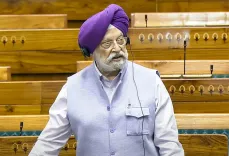Could GST Reforms Moderate CPI Inflation in the Range of 65-75 bps Over FY26-27?

Synopsis
Key Takeaways
- GST reforms could reduce CPI inflation by 65-75 bps over FY26-27.
- Approximately 295 essential items have seen a GST rate reduction.
- Positive fiscal impact with minimal revenue loss anticipated.
- GST rate changes could significantly benefit the banking sector.
- The reforms aim to simplify the tax system, enhancing compliance.
New Delhi, Sep 5 (NationPress) A report by SBI indicates that GST reforms could help in moderating CPI inflation within a range of 65-75 bps over the fiscal years FY26-27. The introduction of the simplified GST 2.0 system is expected to unlock numerous benefits, primarily boosting consumption among the middle class, while also contributing to lower inflation, enhanced business operations, and an improved quality of life.
As the GST rate on essential items, which encompasses approximately 295 goods, has been reduced from 12 percent to 5 percent/nil, it is anticipated that CPI inflation in this category may decrease by 25-30 bps in FY26, factoring in a 60 percent pass-through effect on food items.
Additionally, the rationalization of GST rates on services is projected to result in a further 40-45 bps reduction in CPI inflation for other goods and services, considering a 50 percent pass-through effect, as mentioned in the report.
“Overall, we expect CPI inflation to be moderated within the range of 65-75 bps over FY26-27,” the SBI report stated.
Out of 453 goods whose GST rates have been adjusted, 413 goods saw a decrease in rates, while 40 goods recorded an increase.
The government anticipates a net fiscal impact from this rationalization to be around Rs 48,000 crore on an annualized basis. However, considering growth trends and consumption boosts, “the expected revenue loss in GST is minimal at Rs 3,700 crore, which won’t affect the fiscal deficit,” the report elaborated.
Historically, rate cuts have often resulted in additional revenues summing to nearly Rs 1 lakh crore.
It is crucial to interpret the rationalization not just as a temporary stimulus for demand but as a fundamental measure that simplifies the tax framework, lowers compliance burdens, and fosters voluntary compliance, thereby expanding the tax base.
“In this broader context, the Prime Minister’s vision for a streamlined GST framework is seen as a significant step towards long-term revenue growth and enhanced economic efficiency,” the report highlighted.
The rationalization of GST rates is expected to positively impact the banking sector, influencing its operational metrics significantly.
Particularly for the banking sector, the reform is expected to result in substantial cost efficiencies since most relevant rates have been decreased, as per the report.
The GST on individual health and life insurance premiums, including reinsurance, has been lowered to zero. This removal is set to reduce overall premiums and enhance affordability.
As a result, existing households may consider increasing their health insurance coverage, while new buyers might be attracted to purchase health and term insurance.









